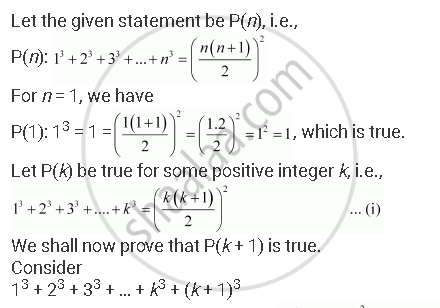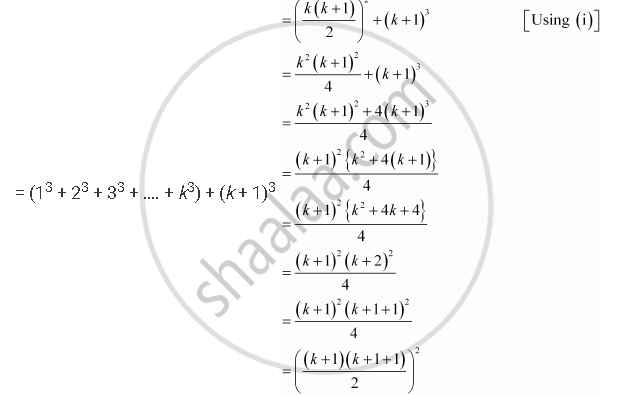Advertisements
Advertisements
प्रश्न
Prove the following by using the principle of mathematical induction for all n ∈ N:
`1^3 + 2^3 + 3^3 + ... + n^3 = ((n(n+1))/2)^2`
उत्तर


Thus, P(k + 1) is true whenever P(k) is true.
Hence, by the principle of mathematical induction, statement P(n) is true for all natural numbers i.e., n.
APPEARS IN
संबंधित प्रश्न
Prove the following by using the principle of mathematical induction for all n ∈ N:
(1+3/1)(1+ 5/4)(1+7/9)...`(1 + ((2n + 1))/n^2) = (n + 1)^2`
Prove the following by using the principle of mathematical induction for all n ∈ N: x2n – y2n is divisible by x + y.
Prove the following by using the principle of mathematical induction for all n ∈ N (2n +7) < (n + 3)2
If P (n) is the statement "n2 − n + 41 is prime", prove that P (1), P (2) and P (3) are true. Prove also that P (41) is not true.
1 + 3 + 32 + ... + 3n−1 = \[\frac{3^n - 1}{2}\]
1.3 + 3.5 + 5.7 + ... + (2n − 1) (2n + 1) =\[\frac{n(4 n^2 + 6n - 1)}{3}\]
52n −1 is divisible by 24 for all n ∈ N.
(ab)n = anbn for all n ∈ N.
72n + 23n−3. 3n−1 is divisible by 25 for all n ∈ N.
Given \[a_1 = \frac{1}{2}\left( a_0 + \frac{A}{a_0} \right), a_2 = \frac{1}{2}\left( a_1 + \frac{A}{a_1} \right) \text{ and } a_{n + 1} = \frac{1}{2}\left( a_n + \frac{A}{a_n} \right)\] for n ≥ 2, where a > 0, A > 0.
Prove that \[\frac{a_n - \sqrt{A}}{a_n + \sqrt{A}} = \left( \frac{a_1 - \sqrt{A}}{a_1 + \sqrt{A}} \right) 2^{n - 1}\]
\[\frac{(2n)!}{2^{2n} (n! )^2} \leq \frac{1}{\sqrt{3n + 1}}\] for all n ∈ N .
\[\text{ Let } P\left( n \right) \text{ be the statement } : 2^n \geq 3n . \text{ If } P\left( r \right) \text{ is true, then show that } P\left( r + 1 \right) \text{ is true . Do you conclude that } P\left( n \right)\text{ is true for all n } \in N?\]
Show by the Principle of Mathematical induction that the sum Sn of then terms of the series \[1^2 + 2 \times 2^2 + 3^2 + 2 \times 4^2 + 5^2 + 2 \times 6^2 + 7^2 + . . .\] is given by \[S_n = \binom{\frac{n \left( n + 1 \right)^2}{2}, \text{ if n is even} }{\frac{n^2 \left( n + 1 \right)}{2}, \text{ if n is odd } }\]
\[\text{ A sequence } a_1 , a_2 , a_3 , . . . \text{ is defined by letting } a_1 = 3 \text{ and } a_k = 7 a_{k - 1} \text{ for all natural numbers } k \geq 2 . \text{ Show that } a_n = 3 \cdot 7^{n - 1} \text{ for all } n \in N .\]
Prove by method of induction, for all n ∈ N:
2 + 4 + 6 + ..... + 2n = n (n+1)
Prove by method of induction, for all n ∈ N:
3 + 7 + 11 + ..... + to n terms = n(2n+1)
Prove by method of induction, for all n ∈ N:
`1/(1.3) + 1/(3.5) + 1/(5.7) + ... + 1/((2"n" - 1)(2"n" + 1)) = "n"/(2"n" + 1)`
Prove by method of induction, for all n ∈ N:
`1/(3.5) + 1/(5.7) + 1/(7.9) + ...` to n terms = `"n"/(3(2"n" + 3))`
Prove by method of induction, for all n ∈ N:
5 + 52 + 53 + .... + 5n = `5/4(5^"n" - 1)`
Prove by method of induction, for all n ∈ N:
(cos θ + i sin θ)n = cos (nθ) + i sin (nθ)
Answer the following:
Prove, by method of induction, for all n ∈ N
12 + 42 + 72 + ... + (3n − 2)2 = `"n"/2 (6"n"^2 - 3"n" - 1)`
Answer the following:
Prove, by method of induction, for all n ∈ N
`1/(3.4.5) + 2/(4.5.6) + 3/(5.6.7) + ... + "n"/(("n" + 2)("n" + 3)("n" + 4)) = ("n"("n" + 1))/(6("n" + 3)("n" + 4))`
Answer the following:
Given that tn+1 = 5tn − 8, t1 = 3, prove by method of induction that tn = 5n−1 + 2
A student was asked to prove a statement P(n) by induction. He proved that P(k + 1) is true whenever P(k) is true for all k > 5 ∈ N and also that P(5) is true. On the basis of this he could conclude that P(n) is true ______.
Prove the statement by using the Principle of Mathematical Induction:
32n – 1 is divisible by 8, for all natural numbers n.
Prove the statement by using the Principle of Mathematical Induction:
For any natural number n, 7n – 2n is divisible by 5.
Prove the statement by using the Principle of Mathematical Induction:
For any natural number n, xn – yn is divisible by x – y, where x and y are any integers with x ≠ y.
Prove the statement by using the Principle of Mathematical Induction:
n2 < 2n for all natural numbers n ≥ 5.
Prove the statement by using the Principle of Mathematical Induction:
2 + 4 + 6 + ... + 2n = n2 + n for all natural numbers n.
Prove the statement by using the Principle of Mathematical Induction:
1 + 5 + 9 + ... + (4n – 3) = n(2n – 1) for all natural numbers n.
Prove that `1/(n + 1) + 1/(n + 2) + ... + 1/(2n) > 13/24`, for all natural numbers n > 1.
Prove that number of subsets of a set containing n distinct elements is 2n, for all n ∈ N.
If xn – 1 is divisible by x – k, then the least positive integral value of k is ______.
